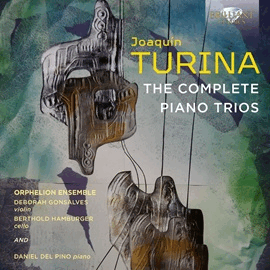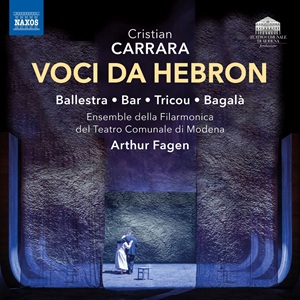Mit seiner Oper Voci da Hebron hat Cristian Carrara 2024 ein hoch aktuelles und brisantes Thema aufgegriffen: den palästinensisch-israelischen Konflikt. Sein in Metz uraufgeführtes Bühnenstück ist ein sehnsüchtiger Wunsch nach Frieden und Versöhnung.
Das Libretto lässt keine Zweideutigkeiten zu: Eine israelische Soldatin und ein palästinensischer Archäologe werden von einem alten Mann aufgefordert, gemeinsam Verantwortung für das Haus zu übernehmen, das er beiden nach dem Tod seiner Frau schenkt.
Der alte Mann – wohl Verkörperung einer höheren Macht – will Frieden und Eintracht, statt Hass und Krieg. Dass er mit der Soldatin und dem Archäologen im Schatten eines Olivenhains rastet, der dem biblischen Garten Gethsemane, wo Jesus verraten wurde, verdächtig ähnelt, bringt etwas viel Klischee ins Libretto.
Carraras Musik beschränkt sich auf die rezitativische Begleitung der Erzählung, die vorwiegend aus Dialogen besteht. Auch hier kommen von Beginn an keine Zweifel auf: Arabische Motivik grenzt den Ort des Geschehens klar ein.
Bei derart eindeutigen Text- und Musik-Vorgaben bleibt den Interpreten kaum Spielraum für eigene Gestaltung. So kann das gesamte Ensemble diese Geschichte, die so viel dramaturgisches Potenzial hätte, bloß konzentriert und gepflegt nacherzählen.
In his opera Voci da Hebron, Cristian Carrara addressed a highly topical and explosive subject in 2024: the Palestinian–Israeli conflict. His stage play, which premiered in Metz, conveys a longing for peace and reconciliation.
The libretto leaves no room for ambiguity: A female Israeli soldier and a Palestinian archaeologist are asked by an elderly man to share responsibility for the house he leaves them after his wife’s death.
The old man — probably the embodiment of a higher power — desires peace and harmony over hatred and war. The fact that he rests with the female soldier and the archaeologist in the shade of an olive grove that looks suspiciously similar to the biblical Garden of Gethsemane, where Jesus was betrayed, adds a touch of cliché to the libretto.
Carrara’s music is limited to recitative accompaniment to the narrative, which consists mainly of dialogue. Once again, there is no ambiguity from the outset: Arabic motifs clearly delineate the location of the action.
With such unambiguous text and musical specifications, the performers have little scope for their own interpretation. Consequently, the entire ensemble can only retell this story, despite its considerable dramaturgical potential, with concentration and care.


















